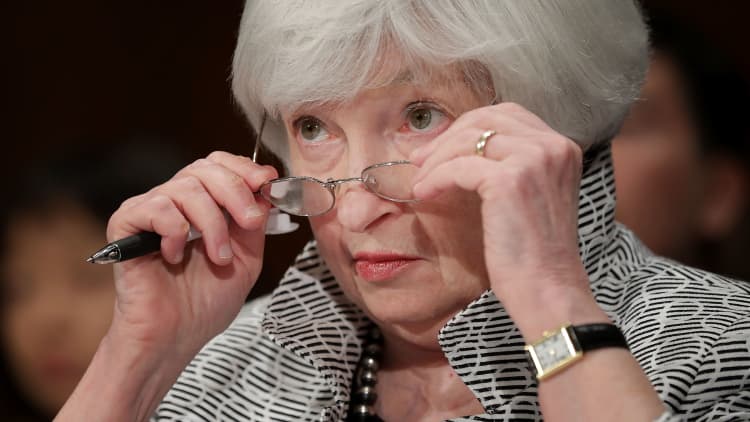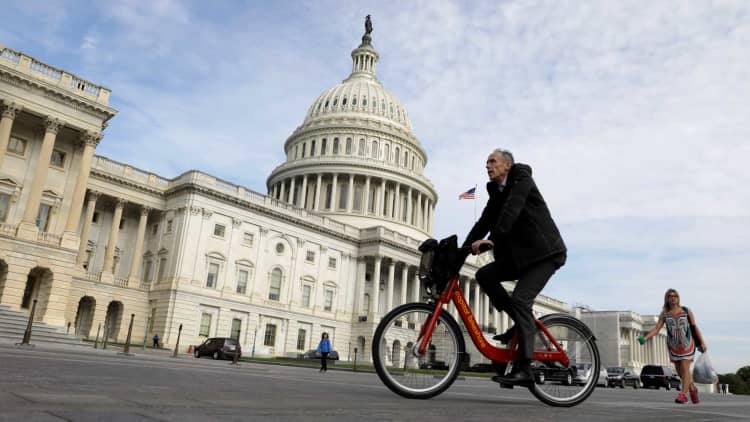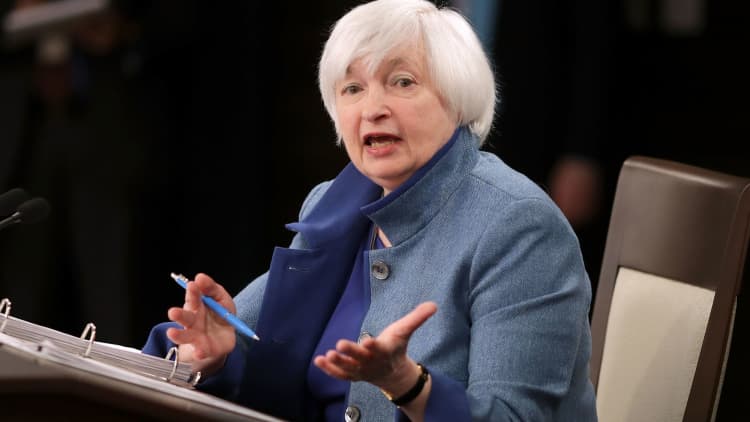
The Fed could soon start to shrink its massive balance sheet, unless Congress manages to spook financial markets with a rip-roaring battle over the budget and debt ceiling.
"[The Fed] just signaled that September is quite likely [when] they move forward with this. The biggest risk is the debt limit and any tightening of financial conditions," said Mark Cabana, head of U.S. short rate strategy at Bank of America Merrill Lynch.
The Fed Wednesday said in its post-meeting statement that it would soon follow through on the balance-sheet reduction. It plans to slow down purchases of Treasury and mortgage securities to replace those on its balance sheet that are maturing.
Strategists say the threat of a government shutdown could affect financial markets, and that could slow the Fed's plans. In 2011, the debt ceiling and budget battle led to a downgrade of the U.S. credit rating.
Cabana said he believes it's quite possible that Congress and the Trump administration will have a hard time agreeing to a budget, and the debt ceiling, which is the legislative limit on how much debt the government can take on, could be caught up in the issue.
"[Treasury Secretary Steven] Mnuchin told us that the government would be able to fund itself through September. Once we get into October, it's much more uncertain how long it will last. Our concern is they run out of funding in early October. The current resolution financing the budget runs out in the end of September as well. So you could have a coupling of these two issues," he said. "If there's no budget passed and the debt limit is associated with that, the market could become more apprehensive about the Treasury's ability to make good on its obligations in October."

Northern Trust Chief Economist Carl Tannenbaum said he sees a 25 percent chance that Congress and the Trump administration get into a situation where the government is shut down and the debt ceiling is an issue. Whether that would impact the Fed is unclear.
"It's possible, but I think the bar is very, very high for an event to create an additional delay in the beginning of balance-sheet reduction," Tannenbaum said, adding the unwind of the balance sheet will be a very long process. The market expects the balance sheet to shrink down to $2.5 to $3 trillion in the long run, he said.
As currently anticipated, the Fed would announce in September that it's reducing its monthly purchases by a total $10 billion for a three-month period, and will continue to reduce the purchases in three-month intervals. The balance sheet ballooned with the Fed's quantitative easing program, under which it bought securities during and after the financial crisis to help the economy.
Concerns about the debt ceiling have been showing up in the Treasury market for short-term bills. This has been seen in the recent move higher in 3-month Treasury bill yields, relative to the 6-month bill. Tannenbaum said the 3-year yield has recently been above the 6-month, amid speculation about the government running out of funds around the time that security comes due.
"The market is at least pricing in a chance that there could be a challenge paying out principle at the end of the current three-month bill," Tannenbaum said.
The 3-month was yielding 1.11 percent late Wednesday, close to the 1.13 yield of the 6-month. "The timing of the next Fed meeting is just before the end of the fiscal year. There's going to need to be a continuing resolution to keep the government open," Tannenbaum said. The debt ceiling could be an issue depending on the government's cash flow. "If things look particularly scratchy on the other side of Capitol Hill, history tells us it could make its way into the Fed board room."
Cabana said the fact that both President Donald Trump and Mnuchin have said sometimes a , adds to the risks. "It's certainly a risk. I would say it's a high risk. The timing of the two is a little disconcerting," said Cabana.
The Fed, at its meeting, took no action on rates, and the market does not expect an interest rate hike until December. But if there's a row over the budget that causes market turbulence, a Fed delay of its balance-sheet reduction could slip to later in the year and impact that December rate hike as well.
Peter Boockvar, chief market analyst with the Lindsey Group, said he doesn't expect the budget process to result in strained market conditions or a delay for the Fed.
"I don't think the debt ceiling is relevant to the Fed. The debt ceiling is getting raised. If the government gets shut down, it will reopen. We've been down this road so many times. I don't think this is going to matter. They're teeing you up for September," he said.
Markets had been focused on it in the statement. The Fed's preferred inflation measure is PCE inflation, and that was up 1.4 percent year over year in May, declining since a peak of 2.1 percent in February. The Fed did make a slightly more declarative statement about low inflation, which was taken as dovish.
WATCH: Fed leaves rates, balance sheet policy unchanged



